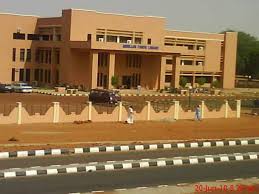Rising coups: Danfodiyo varsity holds global symposium on Niger crisis
The Centre for Peace Studies of the Usmanu Danfodiyo University, Sokoto has organised an international symposium on Niger crisis and the future of African integration. The symposium, which was conducted via zoom, got the participation of eminent scholars from across the African region and beyond. Some of the notable speakers include, Professor Mukhtar Umar Bunza, […]

Usmanu Danfodiyo University, Sokoto, (UDUS)
The Centre for Peace Studies of the Usmanu Danfodiyo University, Sokoto has organised an international symposium on Niger crisis and the future of African integration.
The symposium, which was conducted via zoom, got the participation of eminent scholars from across the African region and beyond.
Some of the notable speakers include, Professor Mukhtar Umar Bunza, Professor Toyin Falola, Dr. Musa E. Umar, and Professor Aja Akpuru-Aja.
Participants observed that the Economic Community of West African States has been inconsistent in adhering strictly to the provisions of the protocol prohibiting unconstitutional change of government.
- Stakeholders ask states to develop laws to tackle GBV in schools
- Jigawa students jubilate as govt offsets registration fees in tertiary schools
They also observed that the sanctions imposed on Niger Republic was causing a lot of hardships and sufferings to the ordinary citizens of the country.
“Good governance and democracy are the fundamental mechanisms for the promotion of peace and political stability,” they maintained.
These were contained in a communique issued at the end of the symposium, which was jointly signed by chairman of the symposium, Abubakar Sokoto Mohammed and Professor M. T. Usman, Director of the Centre.
The communique recommended among others that the channels of communication through dialogue and diplomacy initiated by ECOWAS should be sustained as opposed to the use of force to resolve the impasse in Niger Republic.
They also recommended the immediate release of Mohamed Bazoum and other detained officials unconditionally.
It added that the period of the transition programme for a return to a democratic system in Niger Republic should not exceed one year.
“The sanctions imposed by ECOWAS should be lifted immediately to restore electricity and allow for supplies of food, medicines and other essential necessities for the citizens of Niger.
“ECOWAS should be consistent in upholding the provisions of the protocol that prohibits unconstitutional change of governments among member states.
“African leaders should promote the principles of good governance and avoid constitutional amendments in favour of tenure elongation,” it concluded.
